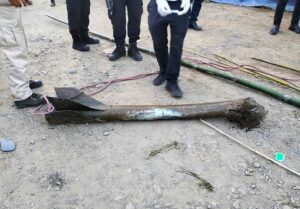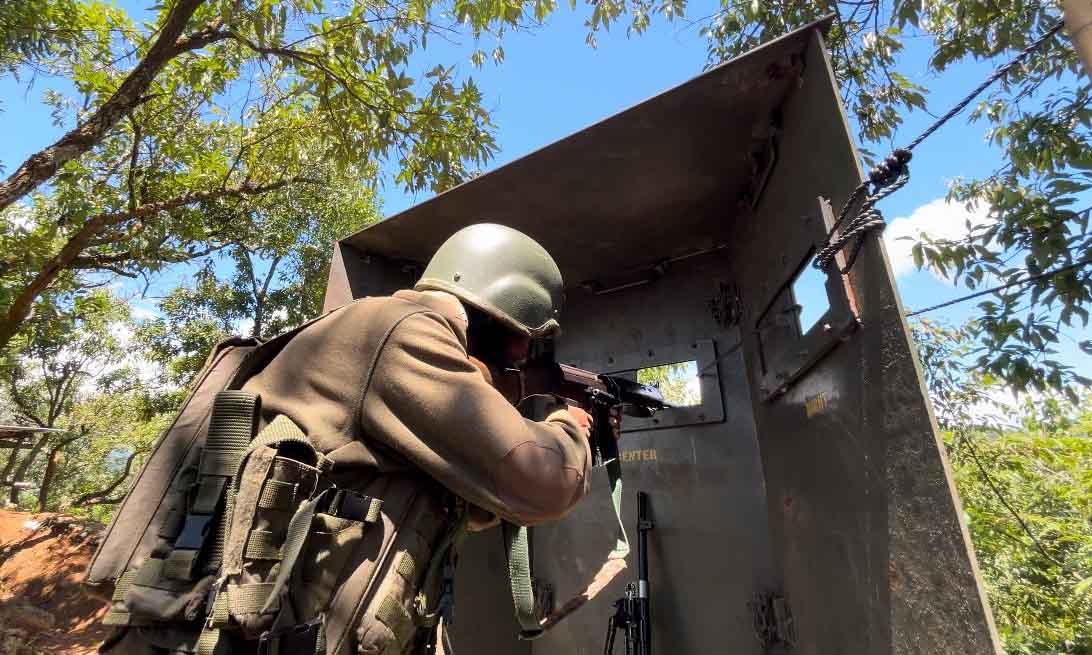In the tumultuous landscape of Manipur, where the echoes of discord reverberate with increasing intensity, the government’s role in safeguarding its citizens remains a subject of grave disillusionment. Over a year and a half since the eruption of ethnic strife between the Meitei and Kuki communities, the state’s inability to curb the violence has become a glaring testament to its administrative shortcomings. The recurrent assertion of governmental efficacy now rings hollow, as the state’s professed competence stands in stark contrast to the stark realities unfolding on the ground. Recent incidents, such as the audacious drone and rocket attacks, have starkly illuminated the government’s pretensions of robust governance as mere bravado—a case of “all hat and no cattle.” These violent episodes not only underscore the government’s impotence in providing effective security but also highlight its persistent evasion of responsibility. The tendency to reshuffle narratives and avoid confronting the stark truth of its inadequacies has become a distressing hallmark of the administration.
Despite occasional proclamations from state officials that the violence—which has already claimed over 200 lives—is subsiding and that peace is on the horizon, the ground reality tells a different story. The violence, far from abating, continues to escalate, casting a long shadow over the prospects for tranquillity. In this atmosphere of persistent peril, the state’s vacillations and ineffectual responses only serve to perpetuate a climate of uncertainty and fear among its populace. Manipur CM N Biren Singh’s assertion that the resolution of the Manipur crisis is a central element of the 100-day agenda of the new National Democratic Alliance (NDA) government, which marks its centenary on September 15, appears increasingly detached from the unfolding chaos. The Modi 3.0 administration’s ambitious plans seem more like a mirage in the desert of escalating violence.
The BJP government, renowned for its proclivity to make grandiose promises, appears to have entrenched a pattern of rhetorical assurances with scant regard for substantive action. As the public’s hopes for peace remain unfulfilled, the region has been subjected to increasingly brazen acts of violence. On September 1, Manipur was thrust into further turmoil as weaponized drones, ostensibly wielded by alleged Kuki militants, orchestrated a coordinated assault on Meitei-majority villages. The audacity of this attack was underscored by the deployment of rocket-propelled grenades (RPGs) via high-tech drones—a development that has drawn official condemnation from the Manipur police on September 6. Compounding the tragedy, the same day witnessed the tragic killing of Ngangom Surbala, a civilian who fell victim to a gun attack by Kuki militants, an assault that also grievously injured her daughter, Rozia. These harrowing incidents not only reflect the deepening crisis but also starkly expose the chasm between governmental declarations and the lived reality of the beleaguered residents. The contrast between the government’s proclamations and the persistent bloodshed underscores a disheartening truth: the promise of peace remains as elusive as ever, overshadowed by the relentless violence that continues to ravage Manipur.
As public condemnation of the government’s inability to counter the escalating violence reached a crescendo, a devastating new chapter unfolded in Moirang town on 6 September 2024. Amidst a human chain protest demanding decisive government action, an elderly man who was offering prayers fell victim to a rocket-propelled grenade attack. The explosive device struck perilously close to the residence of Manipur’s first Chief Minister, Mairembam Koireng Singh, just 100 meters from the Indian National Army (INA) Museum in central Moirang. The attack, which injured five others, including a 13-year-old girl, has brought a new level of fear to this previously considered safe haven. Moirang, long perceived as shielded from the conflict due to its distance from Kuki-dominated areas, had never before witnessed such an aggressive assault. The unprecedented violence has triggered widespread panic, with residents hastily relocating to perceived safer areas. Many are abandoning their non-brick homes in favor of more secure brick structures.

Kumam Davidson, a Moirang Lamkhai resident and founder of the Matai Society, described the profound impact of the attack. “The rocket strike has caused significant distress, particularly among those with pre-existing conditions such as hypertension and anxiety, including children and the elderly,” Davidson told the Imphal Review of Arts and Politics (IRAP). “I am relocating one of my family members to a safer location just now. We are focusing on ensuring the security of the most vulnerable, including those living in particularly exposed homes.”
This latest assault has not only exacerbated the public’s frustration with the government’s ineffectiveness but also shattered the illusion of safety in Moirang, further inflaming the pervasive sense of insecurity throughout the region.
Davidson and his colleagues at the Matai Society, who have been on the front lines of relief efforts since the onset of violence in May 2023, have now been compelled to suspend their operations. “We’ve halted all relief work temporarily,” Davidson explained. “Our volunteers are now at risk themselves, making it impossible to continue our routine activities in such a volatile environment. For the time being, we will shift our focus to coordinating efforts remotely from home. People are fleeing to safer areas, and our immediate priority is to navigate this crisis.”
Davidson’s concerns extend beyond logistical challenges. “The nights are particularly terrifying,” he added. “We have no clear understanding of how effectively the security forces are safeguarding the populace. The prevailing atmosphere is one of profound fear and uncertainty. The reality is that any one of us could be a victim tomorrow. This constant threat hangs over us, and our greatest fear is the persistence of this uncertainty. We are anxiously awaiting the security forces’ response to protect us and address the crisis.”
The rocket strike on September 6 occurred within the span of merely a week after the drone assaults on the villages of Kadangband and Koutruk, nestled in the Imphal West district. The news of this fresh assault has swiftly permeated the state, but it has reverberated with an especially profound and disquieting resonance among the inhabitants of these villages, who were already gripped by the looming dread of further drone attacks. The situation has taken a particularly grave turn for them, having been teetering on the precipice of anxiety, now exacerbated by the sudden rocket onslaught.
Chinglen Thingujam, serving as the General Secretary of the Kadangband Part II local club, has simultaneously assumed the mantle of a vigilant village volunteer, marshaling efforts to safeguard the populace since May 2023. With resolute determination, he has organized a cadre of volunteers from across the state, converging upon Kadangband to shield the village and its neighboring areas from imminent threats till now.
When Kuki militants initiated their campaign of drone warfare on September 1, Chinglen, overcome with emotion, confessed to IRAP with a voice quivering under the weight of both sorrow and resolve, that the community was in no position to defend itself against such technologically sophisticated assaults. His words, tinged with tears, betrayed the mounting despair at the onslaught. Now, with the devastating news of rocket attacks resulting in casualties in Moirang town, his anxieties have only deepened. Yet, despite the overwhelming odds, Thingujam remains undeterred, his resolve unshaken, steadfast in his commitment to protect his community from these relentless attacks.
Upon hearing of the rocket attack, the residents of Kadangband Part II have been put on high alert. This area has long been a target of orchestrated assaults by Kuki militants, and the shadow of past violence looms heavily over us. We’ve instructed the women and the elderly to have their dinner early and retreat to safer locations for the night.”
When questioned about the state of security, he responded with measured resolve: “We have urged the central forces stationed here to remain vigilant and respond promptly in the event of an attack. There have been occasions in the past when their assistance was lacking, leaving us to fend for ourselves. However, this time, we have made it clear that their intervention will be crucial if we face another assault. The youth of the village are already stationed in strategic locations, ready to defend our homes. Although the uncertainty is palpable, and fear lingers in the air, we stand prepared.”
The prolonged violence, now stretching over a year and a half, has left the local populace disillusioned and weary of the government’s inaction. When asked what he would implore the government to do in terms of ensuring their safety, he sighed and said: “There is much we would ask of the government, but the reality is, they don’t listen. We are at a loss for what more to say. Despite our pleas, they have consistently failed to act. In the present climate, it seems as though the Kuki militants operate with impunity, as if the government has abdicated its responsibility to rein them in. But when it comes to the Meitei community, especially those of us living in the foothills, it feels as though the government’s interest in our protection is half-hearted at best. We are disheartened, watching the government’s indifferent response to the relentless violence against us.”
The recent surge in drone bombings and rocket attacks starkly underscores the government’s glaring inability to safeguard its citizens, despite repeated assurances that the violence is waning and peace is imminent. What began as an ethnic conflict primarily characterized by gunfire has now escalated into a more sophisticated form of warfare, with Kuki militants deploying drones and long-range rockets. The government’s presence, while nominally acknowledged, feels illusory, as tangible action remains conspicuously absent. With attacks now coming from the skies and striking from distant vantage points, the people find themselves in a state of waiting for their fateful days. They are disillusioned by a government that, over the past year and a half, has offered little more than hollow promises of safety, leaving them defenseless due to its inaction.












